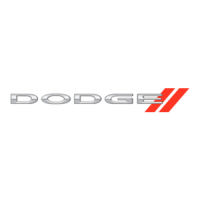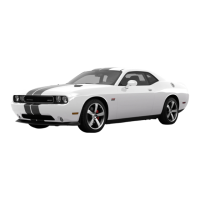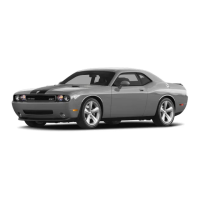Do you have a question about the Dodge CHALLENGER SRT 2017 and is the answer not in the manual?
Important safety warnings and cautions to prevent collision, injury, or vehicle damage.
Explains the location and importance of the VIN for vehicle identification and registration.
Explains the Sentry Key Immobilizer system that prevents unauthorized vehicle operation.
Details on how the security alarm monitors doors, trunk, and ignition for unauthorized entry.
Details about the key fob, keyless ignition system, and key fob operation.
Explanation of the push-button ignition, its positions, and backup methods.
Explains manual door lock operation and the use of the door lock knob.
Details on using the power door lock switch and the Keyless Enter-N-Go system.
Explains how to use the key fob to start the engine remotely for convenience.
Details on adjusting, dimming, folding, and heated mirrors for optimal visibility.
How the rearview mirror automatically adjusts for headlight glare and its on/off function.
Explains the BSM system, its radar sensors, and warning lights in mirrors.
Explains the RCP feature for detecting oncoming vehicles when backing out of parking spaces.
General information about seats as part of the Occupant Restraint System and safety warnings.
Operation of power seat switches for adjusting seat position forward or rearward.
Design and adjustment of head restraints to reduce neck injury risk in rear impacts.
Step-by-step instructions for opening the hood using the release lever and safety catch.
Covers the operation of headlights, parking lights, and interior lights via the headlight switch.
How the automatic headlight system adjusts to ambient light, including time delay features.
Explains the rain sensing feature that automatically activates wipers based on moisture.
How to adjust the steering column manually for tilt and reach.
Details on engaging and using the speed control (cruise control) system.
Explanation of ACC for enhanced driving convenience on highways and major roadways.
Explains the FCW system providing audible and visual warnings for potential frontal collisions.
Explains the ParkSense system providing visual and audible distance indications when backing up.
Information on the rear backup camera, its image display, and caution notes.
Location of courtesy/reading lights, sunglass storage, HomeLink, and sunroof switch.
How HomeLink replaces multiple remote transmitters for operating garage doors and gates.
Location of the power sunroof switch and general operation.
Overview of the main components and controls of the instrument panel.
Specific details and descriptions of the SRT instrument cluster display.
General information on warning and indicator lights, their meanings, and system check displays.
Explains various red warning lights, such as Seat Belt Reminder and Air Bag Warning Light.
Details what the brake warning light signifies regarding fluid levels and system malfunctions.
Warns of an overheated engine and provides steps to take if the light illuminates.
Warns of low tire pressure and provides instructions for checking and inflating tires.
Monitors the ABS system and indicates when service is required or if the system is not functioning.
Explains green indicator lights like Front Fog, Park/Headlight On, and ECO Mode.
Describes how turn signal indicators flash independently for left or right signals.
Application providing real-time performance indicators for SRT vehicles.
Performance timers for Reaction Time, 0-60, 1/8 Mile, 1/4 Mile, Braking Distance, and G-Forces.
Displays real-time engine data like Coolant Temp, Oil Temp, Oil Pressure, and Battery Voltage.
Allows coordination of vehicle systems for different driving behaviors (Track, Sport, Custom, Default).
Predefined configuration optimized for track driving, with systems set to TRACK settings.
Allows creating custom configurations saved for quick selection.
Settings for display, audio, phone, climate, navigation, and vehicle features.
Settings for features like Forward Collision Warning and ParkSense system configuration.
Essential steps before starting the vehicle, including seat adjustment and seat belt usage.
Details on the six-speed manual transmission, including shifting and warnings.
Information on starting the engine, gear selector positions, and cautions for automatic transmissions.
Driver-interactive transmission feature for manual shift control, maximizing engine braking.
Precautions and advice for driving on surfaces with reduced traction like snow, ice, or wet roads.
Explains the hydraulic power steering system, its response, and capabilities.
Instructions on applying and releasing the parking brake before leaving the vehicle.
Information on dual hydraulic brake systems and their performance characteristics.
Details on advanced systems like ABS, EBD, BAS, TCS, and ESC for enhanced stability.
Guidance on tire markings, safety, loading, pressure, and general tire information.
Explanation of tire sidewall markings including size, load index, and speed symbol.
Information on tire placard, load capacity, and proper inflation pressures.
Covers tire pressure effects on safety, economy, tread wear, and ride comfort.
Importance of proper tire inflation for vehicle safety, stability, and performance.
How tire inflation affects tire rolling resistance and fuel consumption.
Location and operation of the hazard warning flasher switch for emergency signaling.
Actions to take to reduce overheating potential and manage impending overheat conditions.
Importance of proper lug nut/bolt torque for wheel mounting and safety.
Description, storage, components, operation, and precautions for the tire service kit.
Detailed steps for safely jump-starting a vehicle with a discharged battery.
Techniques for freeing a vehicle stuck in mud, sand, or snow using a rocking motion.
Procedure for releasing the parking brake manually when the transmission is stuck in PARK.
Guidelines and procedures for towing a disabled vehicle using commercial services.
Information on the EARS system, which responds to accidents by contacting emergency services.
Explains the purpose and data recorded by the Event Data Recorder in crash situations.
Identifies major components in the engine compartment for the 6.2L Supercharged engine.
Identifies major components in the engine compartment for the 6.4L engine.
Explains the OBD II system for monitoring emissions, engine, and transmission controls.
Requirements for vehicle emissions inspections and ensuring OBD II system readiness.
Information on interior bulb types (wedge base, cartridge) and their numbers.
Notes on lens fogging and how to clear it by turning on lamps.
Step-by-step instructions for replacing passenger and driver side halogen headlamp bulbs.
Warnings and information about servicing HID headlamps due to high voltage risks.
Lists approximate fluid capacities (Fuel, Engine Oil, Cooling System) for the 6.2L engine in U.S. and Metric units.
Lists approximate fluid capacities (Fuel, Engine Oil, Cooling System) for the 6.4L engine in U.S. and Metric units.
Instructions for checking and changing engine oil, including oil selection and viscosity.
Importance of the air cleaner filter for engine protection and performance.
Information about the maintenance-free battery and remote jump-start terminals.
Recommendations for servicing the air conditioner for optimal performance.
Location and replacement procedure for the cabin air filter.
Recommendations for lubricating locks, pivots, hinges, and other body components.
Cleaning and maintenance of wiper blades for optimal performance.
Best protection against carbon monoxide entry and inspection guidelines.
Warnings and cautions regarding the cooling system, including hot coolant and pressure caps.
Information on dual hydraulic brake systems, performance, and inspection requirements.
How to check and maintain the brake fluid level in the master cylinder.
Details scheduled maintenance services to protect warranty, ensure performance, and reliability.
Checks to perform at each fuel stop, including engine oil and washer fluid levels.
Monthly checks for tire pressure, battery terminals, fluid levels, and lights.
Actions to take during each oil change, including inspecting brake hoses and lines.
Advice on preparing for service appointments, including bringing papers and keeping a maintenance log.
Manufacturer's commitment to customer satisfaction and the importance of authorized dealer service.
Contact information for FCA US LLC Customer Center in Auburn Hills, MI.
Contact information for FCA Canada Inc. Customer Center in Windsor, Ontario.
Details the terms and provisions of FCA US LLC warranties applicable to the vehicle.
Recommends Mopar fluids, lubricants, and parts for optimal vehicle performance and operation.
How to report vehicle safety defects to NHTSA and FCA US LLC, and information on recalls.
| Brand | Dodge |
|---|---|
| Model | CHALLENGER SRT 2017 |
| Category | Automobile |
| Language | English |











